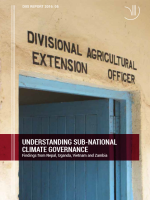Is the Paris Agreement proving its strength in global climate action?
Despite Donald Trump’s decision to pull the US out of the Paris Climate Agreement, there are still grounds for cautious optimism. The agreement will continue to foster a fundamental change in the global climate change regime, and the nature and context of the agreement provides insights into how other global governance efforts - such as the Sustainable Development Goals - can be approached.
These were among the key points in a presentation by Thomas Hale,Associate Professor in Global Public Policy at the University of Oxford and author of several books on global governance,at the recent DIIS seminar “Global climate governance in a changing world”.
At the seminar, Hale discussed how the Paris Agreement evolved to incorporate two key principles, namely (i) that countries determine their own goals, which are then regularly reviewed and “stepped up”, and (ii) that subnational and non-state actors are key players alongside national governments and part of the collaborative process.
Because of this approach, the US government’s withdrawal does not in itself cancel the Paris agreement, and it does not stall the actions of other governments or indeed other US stakeholders such as states, local governments and private sector actors. Moreover, as it takes four years to withdraw from the agreement, the situation may be temporary and the next US election may create a different situation altogether.
According to Hale, the Paris Agreement may therefore be on to the right approach in terms of catalyzing global collective action, due to its emphasis on facilitating and incentivizing action by multiple different actors at the same time, rather than making everyone dependent on each others’ actions. Alongside this, the discourse on green development has shifted so that it is no longer considered a burden but an opportunity by many players, as seen in the rapidly growing investments in renewable energies and their increasingly low costs.
This does not mean that all is rosy. For example, while China and EU appear to be stepping into a leading global role on climate action, their policies are sometimes contradictory to this aim. For example, while China is promoting renewable energy in South-South collaboration with e.g. African countries, it is also taking a highly carbon-intensive approach to the development of its international Belt and Road infrastructure initiative in Asia, Europe and Africa.
Moreover, as emphasized by both Hale and the subsequent plenary discussion, the issues of climate financing and compensation for developing countries has made limited progress and will be further affected by the withdrawal of US funds. Here, the answers may lie outside multilateral negotiations and agreements. As one example, Hale pointed out that climate litigation is a growing field that needs more attention in debates over compensation for climate-related loss and damage.
A range of other issues were raised in the plenary session, including whether politics is really all that important compared to technology and markets, and whether the Paris Agreement promises any real change or simply diverts attention from the current economic paradigm.
DIIS Experts




